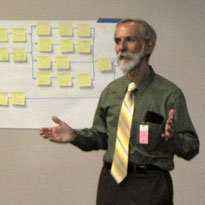Software Project Management
- Course:Software Project Management
- Course ID:SWPM Duration:2 days Where: Your Office (7+ Persons)
- Download Course Description (PDF)
Available as a private, customized course for your group at your offices or ours and in some cases as a WebLive(TM) class.
Course Outline
- Introduction
- Objectives
- Software life cycles
- Software project planning
- Software project tracking
- Estimation techniques
- Risk management
- Configuration management
- Software life cycles
- Waterfall model
- Incremental and evolutionary models
- Spiral model
- Unified Process
- Agile life cycle models
- Software project planning
- Resources, tasks, and time
- Task planning with work breakdown structure
- Resource planning
- Scheduling with network diagrams and Gantt charts
- Creating the project plan
- Software project tracking
- Tracking deliverables
- Tracking costs
- Tracking effort and productivity
- Managing changes in the project team
- Maintaining the project plan
- Estimation techniques
- Expert-based methods
- Analytical methods
- Top-down and bottom-up estimation
- Estimation techniques at various project phases
- Creating and maintaining an estimation database
- Risk management
- Risk identification
- Risk analysis
- Risk mitigation
- Risk monitoring
- Configuration management
- Configuration identification
- Configuration control
- Course wrap-up
- Lessons learned
- Where to go from here
- Discussion and evaluations
Course in a Nutshell
The Project Management Body of Knowledge (PMBOK) defines a project as a temporary endeavor undertaken to create a unique product or service. In the software arena, we immediately think of a software development project, in which the resulting product is reliable, executable software that meets its intended design goals. But there are many other types of software projects, e.g., maintenance projects, in which the product is a modified version of existing software; outsourcing projects, in which the production responsibility is split between a customer organization that articulates requirements and an independent developer organization; a verification/validation project, in which a customer engages two organizations, one to design and build the software and another to independently test it; and so on.
This course will help you understand how a development project differs from other types of projects and the roles played by the various parties in the execution of different types of software projects. You will delve into traditional and cutting edge software life cycles, such as waterfall, incremental, and agile. You will learn the project planning and project tracking techniques that are used throughout the software life cycle, in projects of every type, beginning with estimating the cost and duration of the project and ending with delivery of the product to the end user in the field. In short, you will learn everything needed to complete a software project successfully, on time and within budget.
Customize It!
- Are you engaged in a specific class of projects, e.g., maintenances? We can customize the course to focus on the types of projects you undertake.
- Are you interested in a specific set of software life cycle models, such as the Unified Process or Scrum? We can tailor the course to address only those lifecycle models that interest you the most.
Learn How To
- Select a software life cycle model
- Use multiple software project estimation methodologies for effort and schedule
- Organize a project plan
- Establish and control a budget
- Develop a work breakdown structure
- Create a network diagram
- Develop project schedules
- Use earned value analysis to track progress
- Employ configuration management functions to control project changes
- Identify, analyze, prioritize, and mitigate risk
Aimed At
Information Technology (IT) practitioners, including analysts, developers, testers, and managers with current or anticipated near-future management responsibilities.
Prerequisites
None

